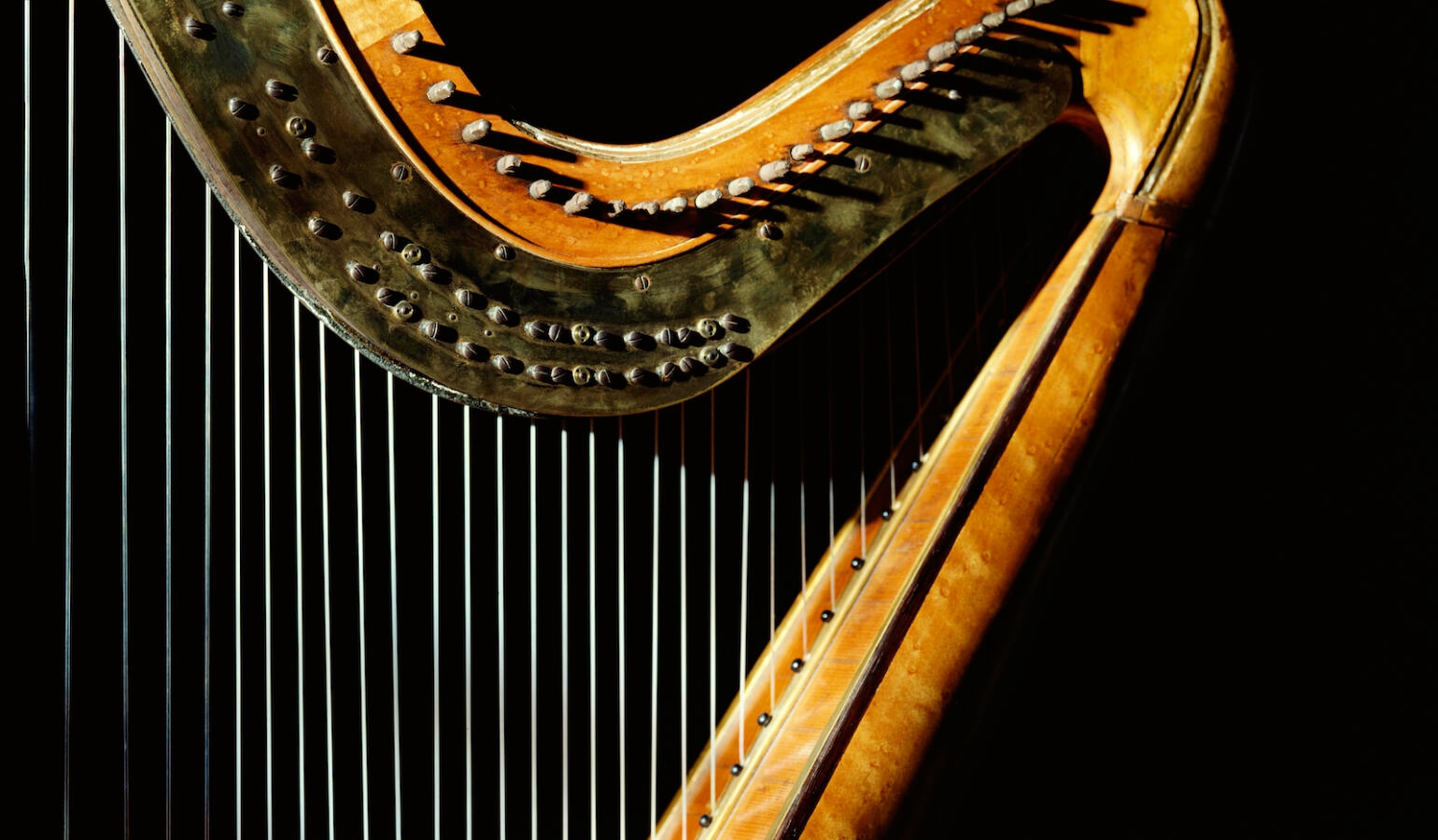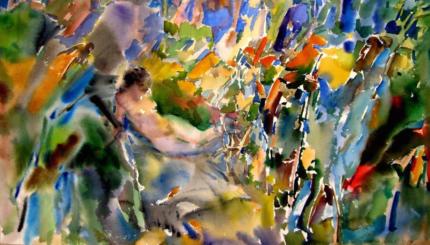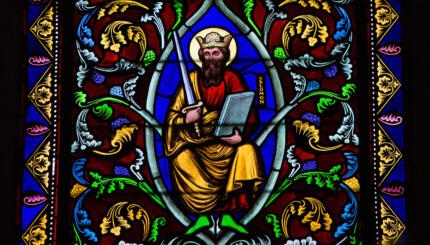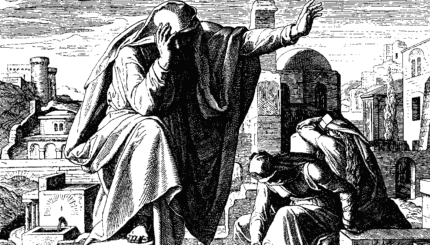The Book of Psalms is an ancient anthology of poetic prayers originally written in Hebrew. It is the first book of the third and final section of the Hebrew Bible, known as Ketuvim (Writings). The English term title derives from the Greek psalmos, meaning “song accompanied by a stringed instrument.” In Hebrew, the book is known as Tehillim (tehillah in the singular) or “songs of praise,” a title that emerged as the preferred Jewish name for the collection during the first centuries of the Common Era (CE).
While we know very little about the origins of most psalms, the early book titles reflect the fact that these poems were used as liturgical materials in various ritual contexts in ancient Israel. To this day, the Psalms are a foundation of Jewish and Christian worship and an inspiration for many other forms of spiritual and creative expression in Western culture.
In traditional Jewish and Christian sources, King David is routinely designated as the author of most or all of the psalms, however modern scholars view them as the work of many writers and editors over several centuries. The anthology was fixed some time during the First Century CE. Contemporary scholars Adele Berlin and Marc Zvi Brettler suggest that in claiming King David as the author of the Psalms, the editors linked these writings with an appropriate and well-known biblical figure to give the compilation greater stature, as was done with other biblical books, including Proverbs (ascribed to King Solomon) and Lamentations (ascribed to the prophet Jeremiah).
In the Book of Psalms itself, David is named as the author of 73 poems. Others are attributed to such biblical figures as Moses, the sons of Korah, and Asaph. Some 50 poems have no attribution at all. There are 13 psalms associated with events in King David’s life, which are based, in part, on narratives from the Book of Samuel. There, David is depicted as both a gifted musician and composer. In the Book of Chronicles he is described as a patron of the Temple choir (1:23, 25) and as an instrument maker (2:7).

Help us keep Jewish knowledge accessible to millions of people around the world.
Your donation to My Jewish Learning fuels endless journeys of Jewish discovery. With your help, My Jewish Learning can continue to provide nonstop opportunities for learning, connection and growth.
In the Jewish and Western Christian traditions, there are 150 individual psalms. These are divided into five books, presumably to mirror the Five Books of Moses. There are also several smaller collections within the individual books, some of which were likely used in different configurations for specific religious undertakings. For example, Psalms 120-134, all of which begin with the phrase “A song of ascent,” may have been recited during ancient pilgrimages to the Temple in Jerusalem.
The Psalms are also commonly divided by modern scholars according to genre or type, rather than their placement within the collection. Common categories include praise, thanksgiving, and lament — though different emotions can be found in a single psalm. For example, in Psalm 27 — the traditional psalm for the Jewish new year season — the poet opens with a statement of confidence in God, but just a few lines later asks the Divine for mercy.
The lament/complaint type is particularly noteworthy theologically because readers might assume that, as a sacred text, the Bible would not contain passages that question God’s behavior. But as the academic duo Joel Lohr and Joel Kaminsky explain, the ancient Israelites believed that God was open to such honest engagement, understanding the great human struggle to integrate experiences of pain and suffering into the spiritual journey.
While the poets and editors of the psalms felt comfortable giving vent to their frustration and anger, they also believed that despite the hardships of human existence, it was still possible — and indeed, necessary — to offer blessings to the Divine for the gifts of life. In fact, the fifth book of Psalms ends with several “hallelujah” (joyous praise) psalms. On the whole, the Book of Psalms is a testament to the ancient Jewish belief in the power of prayer set in the context of a dialogical relationship with God.
One of the reasons so many people have been drawn to the Psalms is precisely because they express an array of human emotion — joy, fear, gratitude, rage, and more. For example, Psalm 23 famously opens with the confident words (in the King James translation) “The Lord is my shepherd, I shall not want.” The previous psalm, however, begins with the pained statement, “My God, my God, why have you forsaken me (22:2)?” As John Calvin famously stated several centuries ago, the Book of Psalms serves as an “anatomy of the soul.”
As Berlin and Brettler note, while the lack of particular historical references in most psalms makes their dating problematic from a scholarly perspective, it also results in the poems having a timeless existential quality. The fact that the psalms are composed both in the first-person singular and the first-person plural has made them useful to a diverse range of worshippers in different life circumstances.
For all these reasons, the psalms permeate Jewish prayer and ritual life. Many of the poems, or select verses from them, appear in the three daily prayer services. There is also a psalm assigned to each day of the week, including Shabbat and other holy days. Eight psalms (95–99, 29, 92, and 93) along with some later writings comprise the Kabbalat Shabbat service recited on Friday evenings. It is customary to recite Psalm 27 following the morning and evening services in the month before Rosh Hashanah through the end of Sukkot.
Psalms are also traditionally recited for a deceased person from the time of their death through shiva, the initial seven-day mourning period. Jewish memorial services are also constructed from psalms and related materials. Additionally, many Jews have the custom of reciting the entire book on a daily, weekly, or monthly basis as a means of gaining God’s favor and protection. In fact, our forebears have utilized various psalms in times of distress — illness, barrenness, famine, war, illness — throughout the ages.
But the Book Psalms is not just a resource to be mined in moments of anxiety, sadness, or loss, but also in many other life circumstances. In turning to these ancient poetic works, modern readers join a diverse intergenerational chorus of Jewish, Christian, and other seekers who viewed these sources as a prism through which to explore their deepest thoughts and feelings, and to share them with God and their communities. Rabbi Akiva, Johann Sebastian Bach, Fannie Lou Hamer, Mother Teresa, and Leonard Cohen all engaged with this evocative and gripping material. In the ongoing search for meaning and purpose, the Book of Psalms offers a rich and multi-textured playlist for real life.
Mishnah
Pronounced: MISH-nuh, Origin: Hebrew, code of Jewish law compiled in the first centuries of the Common Era. Together with the Gemara, it makes up the Talmud.

Help us keep Jewish knowledge accessible to millions of people around the world.
Your donation to My Jewish Learning fuels endless journeys of Jewish discovery. With your help, My Jewish Learning can continue to provide nonstop opportunities for learning, connection and growth.
siddur
Pronounced: SIDD-ur or seeDORE, Origin: Hebrew, prayerbook.

Help us keep Jewish knowledge accessible to millions of people around the world.
Your donation to My Jewish Learning fuels endless journeys of Jewish discovery. With your help, My Jewish Learning can continue to provide nonstop opportunities for learning, connection and growth.



